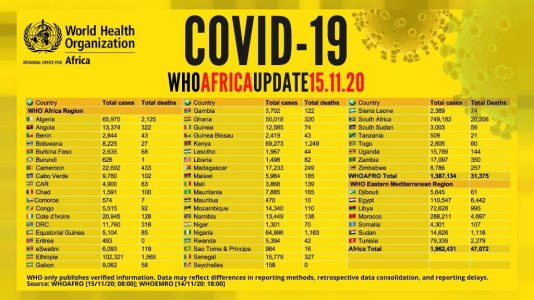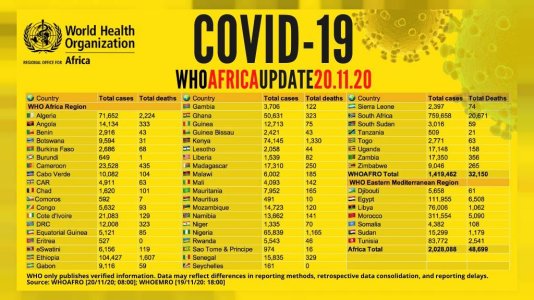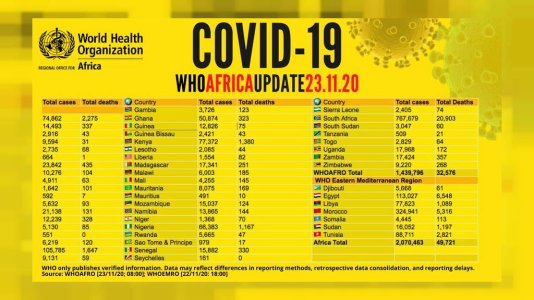Tanzania President John Magufuli: The man who 'banned' coronavirus
Tanzania President John Magufuli's idiosyncratic handling of the coronavirus pandemic has put the country in the global spotlight. Now one of the region's most unconventional leaders is seeking a second term.
When Covid-19 arrived in Tanzania, President Magufuli didn't believe in people staying at home. He wanted them to get into the churches and mosques to pray.
"Coronavirus, which is a devil, cannot survive in the body of Christ... It will burn instantly," Magufuli, a devout Christian, pronounced on 22 March from the altar of a church in Tanzania's capital, Dodoma.
He would later speak against social distancing and the wearing of masks, and questioned the efficacy of testing after sending various animals and fruit to be checked for the virus - he announced that a papaya, a quail and a goat had all tested positive. The president said he could not countenance closing down the economy, and excoriated neighbouring countries for doing so.
Although many might dismiss Magufuli's approach as eccentric, it is emblematic of his combative style.
He also purged thousands of so-called "ghost workers" - essentially non-existent employees - from the public payroll, and fired officials considered corrupt or under-performing, in public. Sometimes this was even done live on television.
And he clamped down on what he saw as extravagant spending, cancelling Independence Day celebrations for the first time in 54 years. Instead, he ordered a public clean-up, getting his own hands dirty by picking up rubbish outside State House.
In the first year of Magufuli's presidency, this approach earned him a great deal of praise, inspiring the Twitter hashtag: #WhatWouldMagufuliDo. While some posts mocked the president's austere policies - for example: "Was about to buy myself an oven then I asked myself #WhatWouldMagufuliDo" with a photo of a saucepan suspended over candles - others called for more African leaders to emulate his leadership style. In 2017, a Kenyan professor went so far as to call for the "Magufulication" of Africa during an address at the University of Dar es Salaam.
But from the outset, it was also clear there was a darker side to his leadership - that a number of his initiatives would slowly chip away at the country's democratic space.
The rap song which came true
In January 2016, barely two months into his term, his administration announced that state TV would no longer broadcast live parliamentary proceedings, as a cost-cutting measure. The opposition saw this as censorship as it was among the few ways it could hold the government to account. It planned demonstrations against the ban, but the government responded by banning all protests.
Another example of such censorship was Magufuli's response to a 2017 song by popular Tanzanian rapper Nay wa Mitego. Less than a day after its release, Mitego found himself in police custody.
"Is there still freedom of expression in this country?" the raspy-voiced artist, whose real name is Emmanuel Elibariki, had rapped.
"What if I speak and later find myself at Central [Police Station]?"
"Are there leaders who make stupid decisions? There are!"
"Are there those who miss [former president] Jakaya Kikwete? There are!"
He was accused of insulting the president and maligning the government. The fear he sang about had come true - he was now being detained at the Central Police Station in Dar es Salaam that he referenced in the lyrics.
Although President Magufuli ordered Nay wa Mitego's release just a day later, he advised that the song should be reworked to include lyrics about other problems in the society, such as tax cheats.
Magufuli's administration has continued to roll out a cocktail of bold and unusual directives, introducing new laws intended to increase revenue from multinational mining firms.
In 2017, Acacia Mining, a subsidiary of Canadian parent company Barrick Gold, was slapped with an incredible $190bn (£145bn) tax bill over royalties the government said it owed, though it denied any wrongdoing. As part of the settlement, Barrick eventually agreed to pay $300m after buying out Acacia, and a new operating company, Twiga Minerals, was formed with the government owning 16% of the joint venture. Barrick and the Tanzanian government also agreed to the sharing of unspecified future economic benefits from the mines on a 50-50 basis.
Then there was his highly contentious decree that Tanzanian schoolgirls who get pregnant cannot return to school even after they have given birth. And in 2018, Tanzania passed a law to punish anyone questioning official statistics, making the state the sole custodian of data. The World Bank said the changes were "deeply worrying".
Getting Tanzania's transport moving
But critics agree that Magufuli has contributed to Tanzania's development in recent years, investing in several large infrastructure projects such as the creation of a standard gauge railway to connect the country with its regional neighbours, the expansion of major highways, and the construction of a bus rapid transit system in the commercial hub of Dar es Salaam. He has also increased electricity production to the grid which has reduced the need for power rationing.
And he has revived the state-run national airline, Air Tanzania, which, plagued by debt and mismanagement for years, was effectively grounded with only one plane in its fleet when he took office.
The president appointed a new board and chief executive of the company, which has gone on to purchase six new planes and integrate others which were under maintenance.
The leader of the East African nation has also introduced free education for all Tanzanians in public schools up to the fourth year of secondary school.
'Data darkness' over coronavirus
But it is Magufuli's handling of the coronavirus pandemic which has brought particular international attention to his governance in recent months.
After the first case on 16 March, the only immediate shutdown was of schools and learning institutions. It took about a month for the country to bring in other restrictions - such as halting sporting activities and closing borders.
Buses and public transport carried fewer passengers, and numbers at pubs and restaurants were restricted, but World Health Organization (WHO) Africa director Matshidiso Moeti accused Tanzania of acting slowly to curb the spread of the virus.
"In Tanzania we have observed that physical distancing, including the prohibition of mass gatherings, took some time to happen and we believe that these might have been probable factors that led to a rapid increase in cases there," the WHO official said in April.
Markets and other workplaces stayed open as normal, as did places of worship.
"We have had a number of viral diseases, including Aids and measles. Our economy must come first. It must not sleep… Life must go on," Magufuli has said.
"Countries [elsewhere] in Africa will be coming here to buy food in the years to come… they will be suffering because of shutting down their economy."
In early June, Magufuli declared the country "coronavirus-free", and the health ministry also announced the closure of coronavirus treatment and isolation centres, which had been set up across the country.
Given Tanzania stopped publishing numbers of its coronavirus cases in May, it is difficult to verify how well the country's approach has worked. The country had 509 infections when it published its final tally on 29 April.
"The country operates in data darkness," Tanzanian analyst Aidan Eyakuze noted recently.
Hospitals around the country appear to be operating normally, though independent media and NGOs have not been able to check that themselves as access has been restricted. In July, doctors told the BBC that hospitals were not overwhelmed.
'I know what it means to be poor'
Magufuli was keen to deal with the virus on his own terms, rather than being influenced by the actions of other regional and international leaders. He styles his governance after Tanzania's first president, Mwalimu Julius Nyerere, who was always fiercely independent.
"Our founding father was not someone to be directed to be told what to do… Those who devise these kinds of rules [lockdown] are used to making these directives that our founding father refused," Magufuli said, referring to Nyerere's habit of rejecting advice coming from Western nations, who the committed socialist distrusted.
Magufuli grew up under Nyerere's rule in a village in north-western Chato district along the shore of Lake Victoria, and says his modest background has inspired his own desire to work for the Tanzanian public.
"Our home was grass thatched, and like many boys I was assigned to herd cattle, as well as selling milk and fish to support my family," he said during his 2015 campaign.
"I know what it means to be poor. I will strive to help improve people's welfare," he added.
After school he worked for a year as a senior school maths and chemistry teacher before returning to further education. He worked for a few years as an industrial chemist before resigning in 1995 to run for the parliamentary seat in his own Chato constituency. After taking that seat, he quickly rose through the ranks to be appointed deputy minister for public works.
The department's senior minister, Mama Anna Abdallah, says his no-nonsense style, focused on efficiency and results, was quickly evident. In his first year in the job he succeeded in steamrolling through the building of a long-delayed road.
"He is a person who seems to want to leave a legacy… That's his character, he wants to make sure things are done properly," she told me.
By 2015, Magufuli wanted to run for the presidency. He is said to have been considered a consensus candidate for the Chama Cha Mapinduzi (CCM) party - which had been in power for 54 years. Analysts say his lack of a political base was seen as an asset rather than a liability, his name not associated with corruption unlike some of his contemporaries.
The elections were the tightest in the country's history, but Magufuli pulled ahead to win with 58% of the vote.
Threatened for speaking out
As Tanzania approaches the vote for a new presidential term, calls for other regional leaders to emulate Magufuli's style have long diminished. He has faced criticism from political opponents, civil society and Western countries, who say he is oppressing the opposition, curtailing press freedom and holding foreign companies to ransom.
But as a president who has often styled himself as a stout African nationalist and a devout Catholic waging war against foreign powers seeking to exploit the East African nation, Magufuli is unlikely to be bothered by such censure.
In the country, few have stood up to him, but for some of those who have, the consequences have been grave.
The president's pronouncements are often final, says Zitto Kabwe, an opposition leader who has been arrested more than a dozen times since 2016.
"The state wants us to keep quiet, they threaten us. The best weapon for us is to speak up and radicalise even more," he told the AP news agency in July.
The main opposition candidate in the forthcoming election is Tundu Lissu from the Chadema party, who survived an assassination attempt in 2017, and required nearly three years in hospital abroad for treatment and rehabilitation. No-one has been convicted for the attempt on his life, and there have been no updates on the police investigation. A few weeks ago he was barred from campaigning by the electoral commission for seven days for alleged ethics violations regarding remarks he made against the president.
But while Magufuli discourages challenges to his authority, he is keen on speaking directly to members of the public and hearing what they have to say.
At the end of July, he chose to be driven rather than flown home from a state funeral so he could stop along the way to listen to bystanders' concerns. He stopped in Mkuranga and listened to their issues - about grabbed land, marital problems, women who had been disinherited, a school without desks. The president tried to find solutions, including holding a fundraiser on the spot.
An expat who worked for the multinational Telco says some of the country's civilians seem to genuinely love a president who gets things done.
As the fight for the presidency draws to a close, Magufuli has the advantage of incumbency, and is backed by a party that has never lost the presidency.
Opposition candidate Tundu Lissu is promising economic growth and respect for human rights. The other key opposition contender is Bernard Membe, a former minister and member of the CCM central committee, who is standing for the ACT-Wazalendo party.
If Magufuli does win a second term, he has promised to continue with infrastructural development and improve people's livelihoods.
But unless his style of governance changes, some opposition activists, independent journalists and critics will fear for their future.









